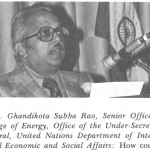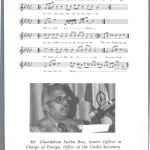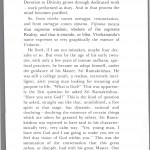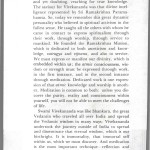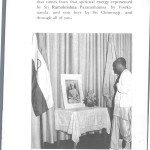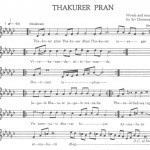Tribute to Swami Vivekananda 19 Jan 1979
Filed under Tributes and Expressions of appreciationAfter a silent dedication, Sri Chinmoy read a poem about Vivekananda which was followed by the performance of two of his songs about the Swami and Chicago, where in 1893, Vivekananda was first recognised at the Parliament of Religions.
TEXT below from cut and paste of ocr doc, to be cleaned up and edited, Check images for original in gallery below)
 Mr. Ghandikota Subba Rao, Senior Officer in Charge of Energy, Office of the Under-Secretary-General, United Nations Department of International Economic and Social Affairs:
Mr. Ghandikota Subba Rao, Senior Officer in Charge of Energy, Office of the Under-Secretary-General, United Nations Department of International Economic and Social Affairs:
How could I have said “no” to the wish of Sri Chinmoyji that I say a few words on this memorable occasion? Sri Chinmoyji composed those beautiful songs, in wh ich h e a p tly sum marizes th e teachings of Swami Vivekananda, one of the most dynamic spiritu al personalities of recent times.
He was the most distinguished disciple of Sri Ramakrishna Paramah am sa, who was himself a grea t reservoir of spiritual energy. T he dynamic aspect of that spirit-ual energy is represented by Swami Vivekananda. There are two aspects: one is the potential energy and the other the spiritual activism of the ascetic. In terms of spiritualism, Vivekananda was an activist. He was the outer expression of the inner strength and inner energy of Sri Ramakrishna. And what a name! Vivekananda – one who lives in the bliss of wisdom, of viveka. Viveka is the capacity to discriminate, to distinguish rather, between the real and the unreal, between the ever-changing reality on the one hand, and the never-changing Reality on the other. Viveka is the foundation for vairagya, renunciation, the renunci-ation of what is unreal and attachment to what is real. Vivekananda used to address his audiences in two ways. One is “brothers and sisters!” in which he expressed the brotherhood, and sisterhood and indeed the universality of man. The other expres-sion, more frequently employed by him in India, was “You children of immortal blissl” -A mn·tasya Putrahl Vivekananda declared at every stage the divinity of man. And how does one manifest this divinity? It is through work, through activism, through dynamism, through the fullest engagement in the world of relativity, while remaining estab-lished in the substratum of never-changing Reality.
It is through worship, dedicated worship, worship through service, worship of the divine nature; and through meditation. For it is through worship and meditation that you incorporate divinity in work. Devotion to Divinity grows through dedicated work -work performed as duty. And in that process the mind becomes purified. So, from viveka comes vairagya, renunciation, and from vairagya comes Vljnana. Vijnana means that supreme wisdom, wisdom of the supreme Reality, and that is ananda, or bliss. Vivekananda’s name expresses so very graphically the essence of Vedanta. He lived, if I am not mistaken, maybe four dec-ades or so. But even by the age of his early twen-ties, with only a few years of intense sadhana, spir-itual practices, he became an adept himself, under the guidance of his Master, Sri Ramakrishna. He was still a college youth, a restless, extremely intel-ligent, alert young man looking for meaning and purpose in life. “What is God?” This was apparent-ly the first question he asked Sri Ramakrishna. “Have you seen God?” This is the kind of question he asked, straight out like that, uninhibited, a free spirit at that stage, but dynamic, rational and doubting-doubting the existence of certain things which are taken for granted by others. Sri Rama-krishna was reported to have said in his character-istically very, very calm way, “Yes, young man, I have seen God and I am going to make you see or feel that vision of God within you.” This was the summation of the conversation that this great sishya, or disciple, had with his great Master. One recalls in this connection another teacher and stu-dent, Sri Krishna and Arjuna. Arjuna was the en-qumng one; the very name Arjuna means “one who is extremely intelligent, extremely rational, extremely alert.” We have here the representative man-dynamic and yet doubting, reaching for true knowledge. The saviour for Vivekananda was that divine intel-ligence represented by Sri Ramakrishna Parama-hamsa. So, today we remember this great dynamic personality who believed in spiritual activism in the fullest sense. He taught all the others with whom he came in contact to express spiritualism through their work, through worship, through service to mankind. He founded the Ramakrishna Mission, which is dedicated to both asceticism and know-ledge, vairagya and vzjnana, and also to service. We must express or manifest our divinity, which is embedded within us; the atmic consciousness, wis-dom or strength must be expressed through work, in the first instance, and in the second instance through meditation. Dedicated work is one expres-sion of that atmic knowledge and worship is anoth-er. Meditation is common to both: unless you dis-cover the purity, reality and consciousness within yourself, you will not be able to meet the challenges of life. Swami Vivekananda was like Shankara, the great Vedantin who traveled all over India and spread the Vedantic wisdom in many ways. Vivekananda undertook the journey outside of India to spread and disseminate that eternal wisdom, which is our birthright. It is immortality, that immortal self within us, which we must discover. And meditation is the most important technique-reflection and meditation, manana andjnana, as we say. Sri Chinmoyji has once again gathered us all to remember one of the greatest personalities, umver-18
Gallery:
- bu-scpmaun-1979-01-27-vol-07-n-01-jan_Page_16
- bu-scpmaun-1979-01-27-vol-07-n-01-jan_Page_17-song-thakurer-pran-score.jpg
- 1979-01jan-19-Trib-Swami-Vivekananda-sri-chinmoy-open-meditates-crp-03-scaled.jpg 598 KB
- 1979-01jan-19-Trib-Swami-Vivekananda-sri-chinmoy-open-meditates-crp-04
- 1979-01jan-19-Trib-Swami-Vivekananda-sri-chinmoy-open-meditatescrp-02



